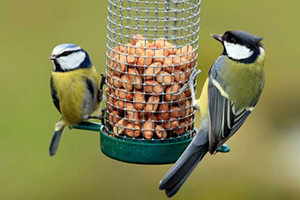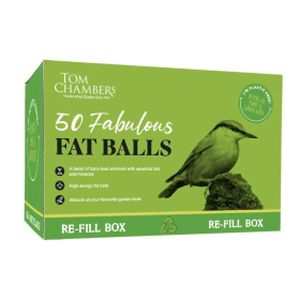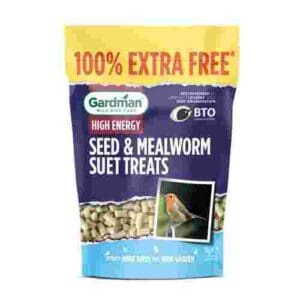
Feeding birds throughout the year, and not just over the winter months, is really important. So, with spring around the corner, don’t be tempted to put those feeders away. Check out our feeding guide.
During winter birds’ natural food sources are in short supply and lots of us put out food daily to help them get the energy they need to keep warm and survive! But, when we see spring starting to arrive, we tend to either stop putting out food or reduce it. But believe it or not, birds actually need our help, not just over winter, but in spring and throughout the rest of the year.
Here’s why…
- With breeding and nesting season underway, spring is when birds require high-energy diets to maintain their health and their homes! And there are lots more little mouths to feed too!
- Energy is needed to defend their territories and protect their chicks, so lots of nutrients are essential.
- Surprisingly, birds may struggle to find food at any time of the year, but when they do, it might be insufficient for their changing needs throughout the year.
What do garden birds eat…
- Fruit: apples, pears and soft fruits are a real treat. And dried fruit, such as raisins and sultanas (beware that these are toxic to dogs).
- Seeds and grains: such as oats, sunflower seeds, millet, niger. Peanuts are also a tasty treat but feed from a small mesh to help prevent choking. Good quality pre-mixed seeds
- Insects: such as mealworms and waxworms – especially popular with baby birds!
- Net-free fat or suet balls: great calorie boosters
- Kitchen food scraps: cooked pasta, rice and boiled potatoes or cheese
- Plant and tree food sources: if your garden plants have fruit, berries, hips, seeds and nuts, that will be a bonus supply for birds, especially in late summer and autumn.
- It’s not just food they need, put out fresh water too on a daily basis
Where and how to feed birds…
- If you want to attract a wide range of birds, offer a variety of high-quality food types in a range of different feeders.
- You can use bird tables, hanging or ground feeders. Birds tend to have different preferences! Certain birds like robins and blackbirds prefer to have their feed on the ground when feeding, whereas the Tit family of birds prefer to cling to hanging feeders.
- Place bowls and feeders in a relatively open area, away from bushes and other areas where predators might hide.
- Place feeders up high, well above cat height
Important Tips
- Keep feeders out, cleaned and filled daily. Many birds die through the transmission of diseases, so it is important to clean and fill water bowls daily and clean feeders weekly, drying them properly before refilling.
- Rotating feeding and drinking areas will help reduce the transmission of diseases too.
Seeing birds in your garden is a real treat and watching them is a great activity and has been proven to be good for our wellbeing.
Check out the Big Garden Bird Watch, which takes place each year and is organised by the RSPB.
If you start to reduce or stop the readily available food, birds will begin to find other food sources and over time, they will stop recognising your feeders as being reliable and will eventually stop visiting your garden for food. So, keep those feeders fresh and filled up throughout the year to keep your feathered friends visiting you each day.








